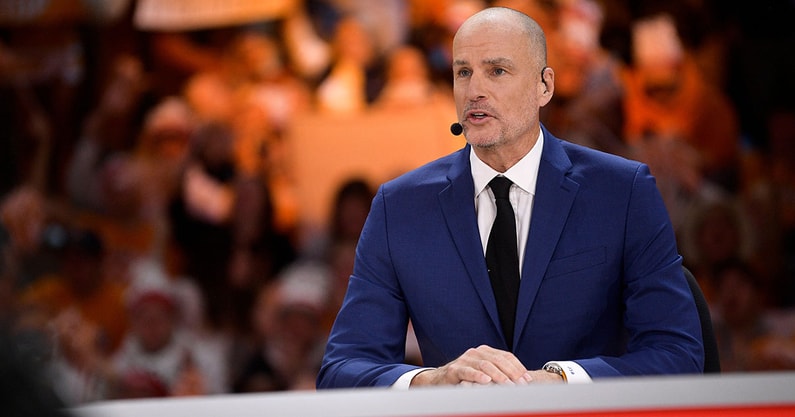Jay Bilas questions NCAA's decision to deny transfer waivers amid conference realignment

This offseason, the NCAA announced it was planning to crack down on waivers for players who enter the transfer portal multiple times. Some recent denials at North Carolina and Florida State have gotten some pushback, including one at Arizona State.
That decision, however, generated a stern response from ESPN analyst Jay Bilas — who pointed to the latest round of realignment to make his point.
The NCAA denied a waiver for wide receiver Jake Smith, who previously transferred to USC from Texas after an injury-filled stint in Austin. However, he again dealt with injuries at USC and was considered a medical non-counter. That meant he wouldn’t be able to play with the Trojans, which is why he again entered the transfer portal and moved closer to home at Arizona State.
Still, the NCAA denied his waiver, meaning he won’t be able to play this year. Bilas strongly disagreed and called out the decision in light of some major conference realignment moves.
“This is interesting,” Bilas wrote. “Forget injuries and the NCAA changing rules after a transfer…what if USC players simply don’t want to play in the Big Ten? Isn’t such a material change in an athlete’s life worthy of a transfer? To the NCAA, it’s not. Go where you’re told, and play for free.”
Why the NCAA has been criticized for how it handles transfer waivers
Current NCAA rules say athletes can transfer one time and be eligible right away without requiring a waiver. To do so again, they’d either need a degree to become a graduate transfer or get a waiver from the NCAA to be immediately eligible.
However, the NCAA’s waiver system has been the subject of criticism of late considering the decisions to deny transfer waivers for Tez Walker at UNC and Darrell Jackson Jr. at Florida State.
“I’ve always said the NCAA needs a vice president of common sense because the VP of common sense could look at these situations and go, ‘If we did this, would anybody care if we didn’t follow the exact letter of the rule? Because if we follow the exact letter of the rule, we’re gonna look like a bunch of jerks. So instead of that, maybe we just let this one go,'” On3’s Andy Staples said. “But that never happens at the NCAA and you get situations like this.”
Top 10
- 1New
Donald Trump blasts NFL
Teams for not drafting Sheduer Sanders
- 2
Jaden Rashada
Makes transfer commitment
- 3
Kim Mulkey
Takes victory lap on South Carolina
- 4Hot
2nd Round NFL Mock Draft
QBs under microscope
- 5
Shedeur Sanders reacts
To going undrafted in 1st round
Get the On3 Top 10 to your inbox every morning
By clicking "Subscribe to Newsletter", I agree to On3's Privacy Notice, Terms, and use of my personal information described therein.
How conference realignment fits into the conversation
USC and Arizona State were two of the schools involved in the latest realignment shakeup. Both could be looking at significant travel as a result. The Trojans are heading to the Big Ten, where they might have to embark on a trip from Los Angeles to Rutgers in Piscataway, New Jersey. For the Sun Devils — one of four Pac-12 teams leaving for the Big 12 in 2024 — a flight from Tempe to Orlando, Florida could be in the cards.
That type of travel sparked some poignant responses from people around college athletics about the toll that could take on student-athletes. For football, it’s not necessarily a big deal. Teams play once a week and it likely won’t impact classes too much.
But for other sports — such as baseball and softball, golf or track and field — events tend to run over multiple days. That means those athletes will have to not only deal with long, normally commercial flights, but also balance their classwork on top of those sports.
That’s why coaches such as Eli Drinkwitz spoke out about what those student-athletes might think of the big moves and compared it to the transfer portal. The comments quickly went viral and gained support from others such as Ole Miss coach Lane Kiffin.
“All right, I’m gonna say it,” Drinkwitz said. “I thought the portal was closed. Oh, that’s just for the student athletes. The adults in the room get to do whatever they want, apparently. My question is: did we count the cost? I’m not talking about a financial cost, I’m talking about did we count the cost for the student athletes involved in this decision? What cost is it to those student athletes?
“We’re talking about a football decision they based off football, but what about softball and baseball who have to travel cross country? Do we ask about the cost of them? Do we know what the No. 1 indicator or symptom or cause of mental health is? It’s lack of rest and sleep. Traveling in those baseball, softball games, those people, they travel commercial. They get done playing at 4, they gotta go to the airport, they come back. It’s 3 or 4 in the morning (and) they gotta go to class? I mean, did we ask any of them?”